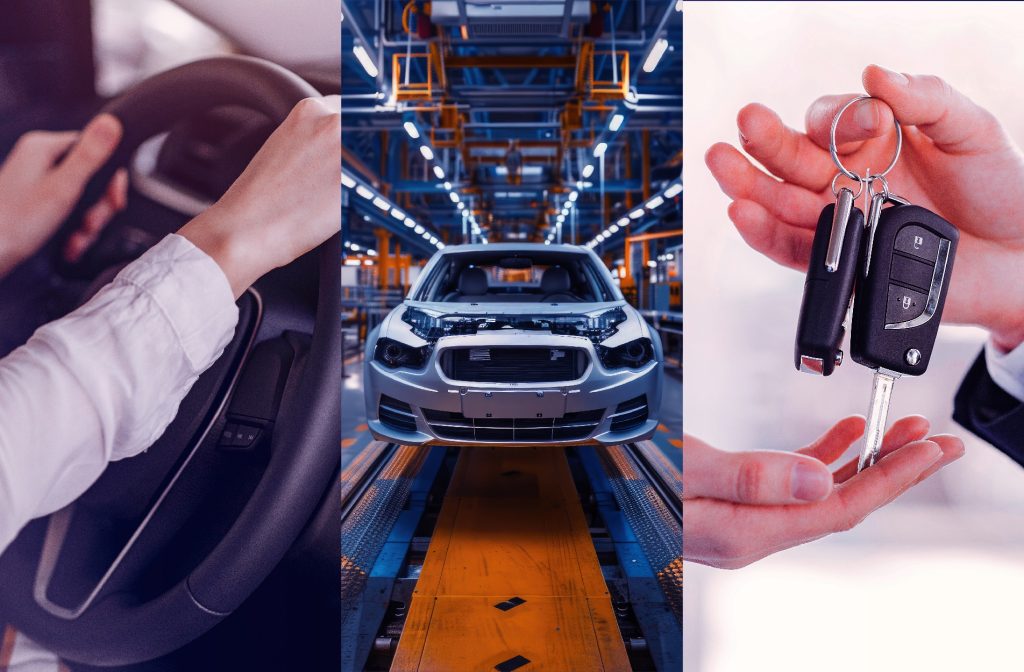
Enhancing Customer Experience through Personalization in the Automotive Sector
In today’s reality, customers expect customization in almost every aspect of their lives, from tailoring their favorite music playlists and video preferences to personalizing their morning coffee and healthcare appointments. The automotive industry has not been immune to this shift in consumer mindset.
Personalization permeates the automotive sector, influencing everything from manufacturing and marketing to the overall customer experience with the end product. This underscores the industry’s recognition of the significance of customization in delivering a seamless and convenient customer journey, ultimately resulting in increased revenue and a positive brand reputation.
As customers demand personalization across various areas of interest, and brands strive to fulfill these requests and cater to their needs to ensure satisfaction, the concept of personalization in the automotive sector takes center stage. In this article, we will delve into what is meant by personalization in the automotive sector, its impact on the customer experience, and why it holds such crucial importance.
Understanding the Concept of Automotive Industry Privatization
Today’s customers no longer settle for off-the-shelf products. Instead, they aspire to customize everything to align with their personal preferences, needs, and requirements to find the perfect product tailored specifically for them. This preference for customization extends to the automotive industry.
In the automotive sector, customization signifies the adaptation of products to align with the unique preferences and personalities of customers, rather than offering a one-size-fits-all solution as was common in the past. According to research conducted by Accenture, 46% of customers are willing to switch to a different original equipment manufacturer (OEM) if it offers a superior customer experience.
Furthermore, 47% of customers contemplate rebranding their vehicles when a company fails to provide a satisfactory customer experience. This statistic underscores the increasing importance of personalization in the automotive sector and the need for automotive brands to prioritize it in order to deliver a distinctive customer experience that retains their customer base.
The Impact of Automotive Customization on the Customer Experience
The customization of the automotive sector significantly enhances the customer experience, resulting in an expanded customer base and increased corporate revenue. Personalization of services not only strengthens a company’s market position but also plays a crucial role in retaining existing customers and attracting new ones.
Tailoring the customer experience allows automotive companies to craft a more positive and memorable interaction for their clients. This, in turn, leads to heightened customer satisfaction, increased loyalty, and ultimately, higher sales. Let’s delve into how automotive brands are embracing customization and the positive impact it has on the overall customer experience:
Digital Retail Experiences
In the automotive sector, customers now expect car manufacturers to tailor their experiences to meet individual needs and preferences. To achieve this, the industry has turned to digital platforms that cater to these requirements. This trend is particularly evident in the United States, where over half of automotive customers report experiencing personalized interactions when visiting manufacturer websites.
Moreover, a significant 74% of car owners believe that the level of personalization they encounter during the car-buying process will greatly influence their choice of brand for future purchases. Additionally, 31% of respondents noted that the user experience’s smoothness played a pivotal role in their most recent car purchase.
Furthermore, 34% of respondents stated that they would have chosen a different car if the user experience had been both smoother and more personalized. These statistics underscore the importance of technology-driven solutions in the automotive industry to digitally transform the retail experience, offering enjoyable and personalized interactions that not only impact current decisions but also shape future purchasing choices for customers.
Marketing & Communication
Automakers employ technical solutions to standardize customer data, elevating their marketing endeavors to a new level. Digital tools offer insights across diverse communication channels, empowering automotive brands to continuously enhance their marketing strategies and overall customer experiences.
These interactions now span a broader array of digital touchpoints, including brand websites, emails, and mobile apps. Technology solutions play a pivotal role in guaranteeing that each customer consistently encounters the same exceptional quality and personalized engagement whenever they interact with the brand.
In-Car Customer Experience
The customer experience doesn’t conclude with the purchase alone. In today’s context, a car is more than just a mode of transportation; it’s an extension of the customer’s personality and a vital part of their lifestyle. Just as customers are accustomed to smart, personalized experiences at home or on their phones, they now seek similar experiences in their cars.
To meet these expectations, automotive companies are increasingly partnering with technology firms to personalize the in-car experience. This involves seamlessly integrating software-defined platforms with customers’ digital lives.
The goal is to craft tailored and user-friendly in-car experiences, leveraging AI-optimized applications for entertainment, voice assistance (such as support for Alexa), navigation, vehicle maintenance, e-commerce marketplaces, and payment services, among others.
Car Delivery Experience
In the wake of the significant developments in the realm of e-commerce and online shopping, along with the convenience brought by food delivery and online ordering, customer expectations have surged. They now aspire to the same level of experience when it comes to the automotive sector—wanting the ability to purchase a car from the comfort of their homes and have it delivered in impeccable condition to a location of their choice.
These heightened expectations have resonated within the automotive industry, prompting car companies to adapt accordingly. Many companies are expanding their mobile services and building their own logistics networks to shorten delivery times.
By offering a combination of retail, telecommunications, and personalized delivery services, businesses can elevate customer engagement, enhance their competitiveness in the market, and ultimately boost sales. As technology continues to advance, the twin pillars of personalization and customization in the customer experience will remain critical in shaping the future of the automotive industry, ushering in transformative improvements for customers.
Unlocking Value through Personalization in the Automotive Industry
Personalization in the automotive sector has a drastic impact on the customer and the sector itself, and below we will take a look at the most important results of this:
Personalization in the Automotive Industry
In today’s automotive landscape, customers seek vehicles that align with their unique personalities, aspirations, and lifestyles. They no longer desire just any car; instead, they aspire to own vehicles tailored precisely to their preferences and tastes. Today’s customers are not merely purchasing a product; they are investing in a personalized experience.
This level of customization extends beyond luxury and high-end automobiles; it encompasses even mid-range vehicles, which can be customized to meet the customer’s preferred color combinations
Personalization in Social Spheres
Automotive brands should not limit customization to the automotive industry alone. They should also tailor their advertising, marketing, and customer experiences across all private communication channels and websites, ensuring that customers encounter precisely the experiences they expect.
The key to achieving this lies in crafting compelling narratives and striking the right balance between content creators and celebrities on social media platforms. Major brands like Hyundai make substantial investments in celebrity engagement and extend their efforts beyond traditional television shows.
They extend these narratives through contextual social media content that highlights key vehicle features, catering to the individual customer’s preferences. These messages are disseminated across various platforms, including Instagram, Twitter (currently X), TikTok, and more.
Personalizing the Moment
For automotive brands, the ‘right moment’ is when a potential customer decides to make a purchase. Brands must engage with customers at precisely that juncture, aligning their interactions with the customer’s needs and digital journey while understanding their motivations.
Strategic advertising and marketing play a crucial role in allowing automakers to spotlight a vehicle’s offerings and features uniquely, tailored to support the customer’s current stage in the process, with customization options extending all the way to customer loyalty.
Identifying pivotal moments that influence decision-making and effectively reaching customers across various touchpoints are imperative in contemporary automotive marketing, characterized by a focus on personalization. Today’s car customers aspire to be acknowledged as unique individuals. If brands fail to meet these expectations early in the customer journey, they risk losing the opportunity to connect with them in the future.
The Psychological Effects of Automotive Personalization on Customers
Personalization has evolved from being a mere customer preference to a compelling demand, now viewed as an absolute necessity. According to a report published by McKinsey, a staggering 80% of customers actively seek customization and express frustration when it’s not available. The clamor for personalization within the automotive sector stems from several factors, including:
Self-Expression
Individuals express themselves in various ways, whether through their clothing choices, home furnishings and decor, or even their choice of vehicle. When it comes to their cars, customers desire a mode of self-expression that reflects their personality, down to every accessory and color. This desire allows them to stand out and feel uniquely connected to their peers and surroundings. Achieving this level of distinctiveness is the goal for automotive brands.
Self-expression serves as a potent force in our society, forging connections between customers and brands. The potential for impact extends to referrals, positive online reviews, and customer loyalty, all of which are intertwined with the personalization of vehicles.
Meeting Individual Needs
Another significant motivation for personalization is fulfilling specific needs. Consider shoes as an example; there’s no one-size-fits-all solution because we all have different foot shapes. Differences extend beyond size and encompass style, functionality, and the level of support required.
Similarly, when it comes to buying cars, individual needs vary. A single woman living in the city has different car requirements compared to a family of five residing in the countryside. Customer preferences can be influenced by factors such as lifestyle, physique, health, and more.
Furthermore, car accessories play a crucial role. A mother with children may require spill-resistant seat covers to protect her car from frequent messes, like spilled cider. Other add-ons can also assist individuals of shorter stature in accessing their high-riding vehicles. Numerous examples illustrate this principle.
Empowering the Customer
Having a sense of control is particularly crucial when it comes to car purchases, and social psychology plays a more significant role than we might recognize. When buying a car, customers anticipate negotiations and desire to feel that they’ve secured a favorable deal, which provides them with a sense of control.
Car customization follows a similar pattern. Personalizing a vehicle at the point of sale not only caters to the customer’s physical preferences but also fulfills their psychological need for control.
Revolutionize the Automotive Industry and Elevate Customer Experiences with Lucidya
When discussing personalization across various sectors, it’s essential to highlight Lucidya’s range of services and precision tools. Lucidya is dedicated to enhancing the customer experience by understanding their needs, requirements, and measuring their interactions. This commitment extends to the automotive sector and its customization needs.
Experience Lucidya’s Auto Customization Services Today!
Conclusion
The commercial objectives behind customizing services can vary based on a company’s vision. Some companies aim to enhance the efficiency of targeted advertising, while others seek to grow their subscriber base. There are also those focused on increasing transaction volumes on their platform.
However, from a customer’s perspective, the most crucial aspect is the feeling of being “known and understood.” Take Amazon, for instance; you no longer need to navigate to a distant grocery store shelf to find your favorite pasta. Even when you log into the platform, you’re likely to receive a recommendation for your favorite product right on the first page. This seamless customer experience is made possible by the platform’s deep understanding of customer preferences, and the same principle applies in the automotive sector.









